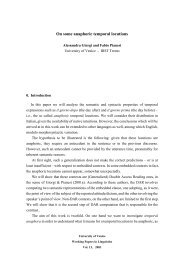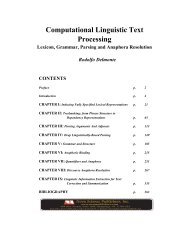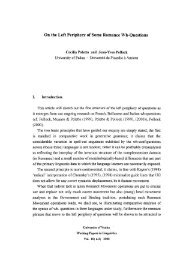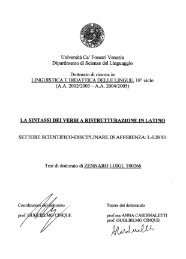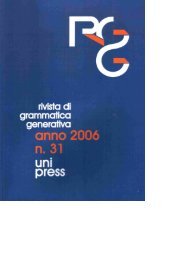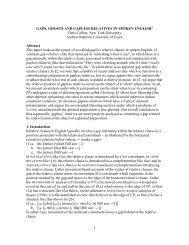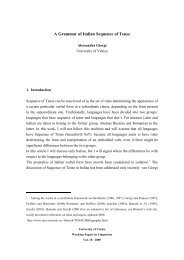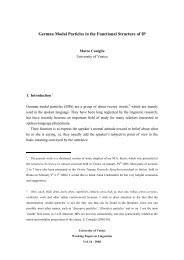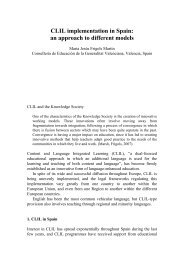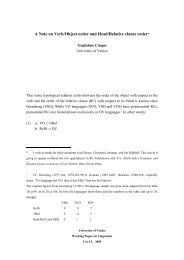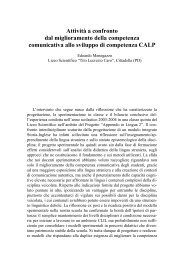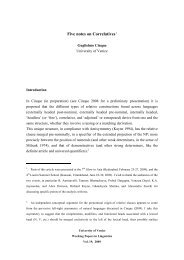Earliness Principle - Lear
Earliness Principle - Lear
Earliness Principle - Lear
You also want an ePaper? Increase the reach of your titles
YUMPU automatically turns print PDFs into web optimized ePapers that Google loves.
-34-<br />
that the be __ of this construction is a modal, base-generated in INFL. Its incompatibility with<br />
infinitives, seen in (ii), shows this:<br />
(i) a. ?If we were to take out the garbage daily, we would have been<br />
given instructions to that effect.<br />
b. *Were we to take out the garbage daily, we would have been<br />
given instructions to that effect.<br />
c. Our instructions were that we weren’t to go near the television.<br />
(ii)a. We are to take out the garbage daily.<br />
b. *For an aristocrat to be to take out the garbage daily would<br />
be a serious insult to his dignity.<br />
c. We are expected to take out the garbage daily.<br />
d. For an aristocrat to be expected to take out the garbage<br />
daily would be a serious insult to his dignity.<br />
9. Thus, in the terms of our speculation, where past tense is just a particular interpretation of a<br />
tenseless form, it has a tenseless form.<br />
10. If INFL is “split” as in P ollock, we may assume that do __is<br />
inserted in T and that AGR moves to<br />
provide do __ with its agreement morphology. The restriction of do __ insertion to T makes sense, since<br />
__ do only occurs in finite forms. I will not be making crucial reference to the “split INFL” hypothesis<br />
here, however.<br />
11. I am using the term “ECM” to refer to Case-marking across a constituent boundary, not<br />
necessarily an IP-boundary.<br />
12. Though one might attempt to defend a claim that ungoverned clauses are all CP, while<br />
allowing governed clauses to be IP.<br />
13. In the next version of this draft, I will elaborate on this: basically my idea is that A-bar<br />
specifier positions are not just a default case, but are determined by the selectional properties of the<br />
heads of which they are specifiers. This kind of A-bar-selection feeds into a generalization of<br />
Burzio’s idea that Case can be assigned by α only if α selects (θ-marks) its subject: only instances<br />
of I that select for their subject, e.g. I containing Q, can assign Case via ECM.<br />
14. The extension to English questions was independently proposed in a March 1988 paper by<br />
Akira W atanabe (antedating my own work). W atanabe<br />
also gives the topicalization argument<br />
presented below (attributed by him to Imanishi (1986a,b)).<br />
15. As an aside, note that C-Inv structures — which involve full CP structure — act like embedded<br />
questions, as predicted, with respect to T opicalization:<br />
*This book [ were [ you to buy]], you would discover…<br />
CP IP



